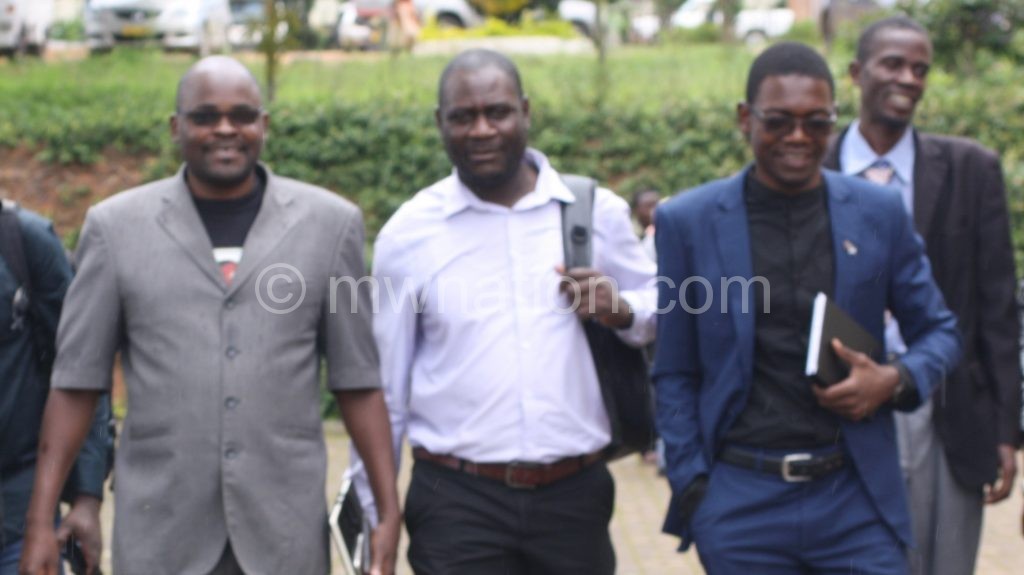Court deals govt blows
- CSOs 4, Government 0
- Chaponda remains restrained
Government yesterday suffered four major setbacks in the maizegate case as the High Court in Mzuzu sustained an injunction against Agriculture, Irrigation and Water Development Minister George Chaponda. The court also ruled that civil society organisations (CSOs) that obtained the injunction must not be removed from the list of applicants.
According to lawyer for the CSOs, Wesley Mwafulirwa, Chaponda will thus remain restrained until the commission of inquiry into the alleged fraudulent purchase of maize from Zambia is concluded, or at that time when the court will decide to lift it.

In addition, Justice John Chirwa also ruled that leave for judicial review of President Peter Mutharika’s decision not to suspend Chaponda amid a probe into the Zambia maize import transaction must proceed.
Technically, according to the CSOs, this decision means any decision by the President can be reviewed in court.
In fact, the State has also been ordered to pay the applicants legal fees, which according to Mwafulirwa, could be in millions of kwacha.
Read More: CSOs file contempt charges against Chaponda
In his determination, the judge also struck Attorney General Kalekeni Kaphale off the list of respondents, effectively leaving Mutharika and Chaponda as the only defendants.
Meanwhile, the three CSOs—Centre for the Development of People (Cedep), Church and Society of CCAP Livingstonia Synod as well as Youth and Society (YAS) and Mwafulirwa have described the ruling as a victory.
Speaking after Justice Chirwa’s determination which was made in chambers, Mwafulirwa said the judge’s determination on the matter was victory for both democracy and constitutionalism.
He said: “We have partly won and partly lost the battle. We have won because the court has agreed with us that this issue is very important and significant and it should proceed for judicial review and that in fact, the order of an injunction has been sustained. So, we have won.
“A landmark decision on our part again is that the court has agreed with us that the CSOs, namely Cedep, Church and Society as well as Youth and Society, have sufficient interest to commence these proceedings, in other words, they have got locus standi.”
In law, locus standi is the term used to describe the ability of a party to demonstrate to the court sufficient connection to and harm from the law or action challenged to support that party’s participation in the case.
Mwafulirwa also said the win was a landmark decision in public interest litigation, especially since the application was won with costs.
“The injunction is to the effect that it will be valid until the commission of inquiry has finished its investigations or until the further order of the court. So long as the commission of inquiry is still investigating, then it means the injunction is valid,” he added.
The commission of inquiry, led by retired Chief Justice Anastazia Msosa, was initially expected to present a report and findings to Mutharika on January 31, but the period was extended to February 9 2017.
Church and Society Programme executive director Moses Mkandawire said after the ruling that “the CSOs were very happy because democracy had won.”
“Civil society organisations now have got the space, the mandate, the privilege to be able to appear before any court and the principle of locus standi has now been interpreted differently, and that is what we have been fighting for.
“Secondly, is the issue that any decision that will have to be made by the Executive will not be absolute; it will have to be reviewed and for us that is another landmark decision by the judge. Sustaining the injunction for us is critical,” he said.
When asked to comment on the matter, Kaphale said he did not have time to talk on the issue as he was still busy working at the High Court in Mzuzu.
However, in the failed application, Kaphale had argued that the court should vacate the order for leave for judicial review because the court does not have the power and authority to review Executive orders by the President.
Meanwhile, Chancellor College law professor Edge Kanyongolo has said every Executive decision is subject to review by the courts.
“You remember in 2001 the court also reviewed a decision by the President to ban demonstrations and assemblies. That was reviewed, and it was declared unconstitutional.
“I think we use the word prerogative wrongly, because prerogative power is essentially unquestionable. We have no prerogative powers in the Constitution, but Executive powers of different kinds,” he explained.
Meanwhile, as Parliament reconvenes for the Mid-Year Budget Review on Monday February 6, former speaker of the National Assembly Sam Mpasu has said one can become leader of government business in Parliament although he or she is not a minister.
He said: “It all depends on the decision by the President, but one can become leader of government business even without being a minister. Normally, the President appoints someone senior from the ruling party to defend government policies. The only problem would be for honourable Chaponda not responding to anything related to the Agriculture Ministry.”





